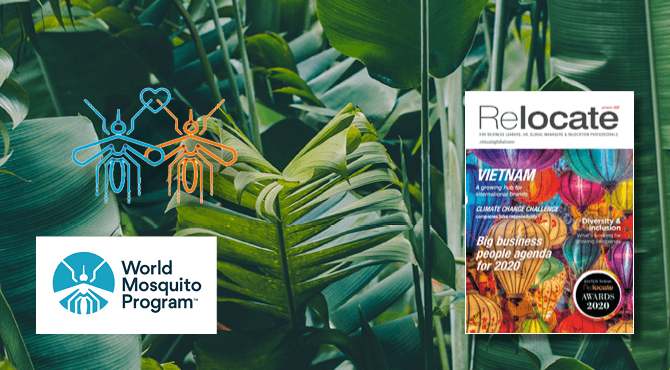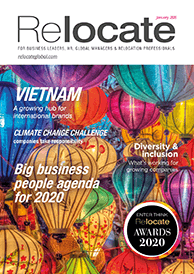World Mosquito Program innovating from Vietnam
A global not-for-profit programme is changing the way we eradicate mosquito-borne diseases, with important implications for local populations, businesses and globally mobile assignees.

 19 December 2019
19 December 2019Click on the cover to access the digital edition and order your printed copy.
The World Mosquito Program (WMP) has chosen Ho Chi Minh City as the base for its Asian hub. A growing team from all over the world are working to support the expansion of the reach of the life-saving work of WMP. The team has partnered with local authorities to start two new Wolbachia release projects nearby.WMP seeks to help protect the global community from mosquito-borne diseases such as dengue, Zika, chikungunya and yellow fever. Vietnam is the perfect location for one of three regional hubs, as it scales WMP’s work from currently impacting 4.4 million people in 12 countries to reaching 100 million by 2023. WMP has worked in Vietnam previously and now has two new project sites to cover a population of 250,000 people. The programme plans, in the future, to grow its deployments across the city and the region where people face a daily threat from these deadly diseases.
What is the Wolbachia method?
There is growing evidence from WMP field trials that the innovative Wolbachia method is effective in reducing incidents of these diseases. The WMP’s method works by introducing Wolbachia into Aedes aegypti mosquitoes that transmit the Zika, dengue, chikungunya and yellow fever viruses. These Wolbachia-carrying mosquitoes are released in areas where mosquito-borne viruses are endemic.Once Wolbachia-carrying mosquitoes are released, they breed with wild mosquitoes. Over time, the percentage of mosquitoes carrying Wolbachia grows until it remains high without the need for further releases. The WMP’s self-sustaining method offers a safe, effective and long-term solution to reducing the burden of these diseases.“We are very inspired being in Vietnam surrounded by the dynamic and ever-changing business and community environment. It is encouraging to get such a positive response from people interested in supporting our work. We will only be able to bring this solution to the billions of people affected with solid partnerships with business, government and philanthropists,” says Enrica Longo, director external engagement at WMP in Vietnam.Related articles:
- Welcoming relocating families in Ho Chi Minh City
- Work with the admissions team for a successful group move
The impact of mosquito - borne diseases on global mobility
Mosquito-borne diseases, such as dengue, Zika, chikungunya and yellow fever, can have devastating effects on the health and wellbeing of people living in an affected country. In addition, outbreaks can deter holidaymakers, which has a knock-on effect on local tourism. Businesses that are looking to relocate may reconsider for fear of employee health, while globally mobile employees who are thinking about taking on an assignment with their family to an affected country might also be deterred. For the business community expanding into Vietnam – a rising relocation destination – it is important to understand how mosquito-borne disease impacts the local population and workforce, the economy and their growth in the country. The human story behind how WMP relocated to Ho Chi Minh City is even more powerful in this context. Having met Australian, Ms Longo and Stéphanie Ralu – founder of Relocation Vietnam, WPM’s chosen relocation company – while visiting the city for the recent EuRA Asia conference and the International School of Ho Chi Minh City, which welcomed the relocating children, I am convinced that there are lessons to be learned from their experience of setting up in Vietnam, as well as connections to be made to help WMP.Download our Group Moves factsheet: employee relations and engagement
Ms Longo is keen to encourage support at all levels. Through our readership and the international wider business community reached by Relocate and Think Global People initiatives, we will endeavour to connect WPM with international influencers and decision-makers through coverage and activities around the world over the next 12 months. This could also be a natural fit for leadership teams, responding to the growing trend in organisations, to support health and wellbeing initiatives. Expatriates themselves, as well as suppliers across the mobility sphere, will hopefully want to get involved.WMP currently has two regional hubs – an Asia hub in Ho Chi Minh City, Vietnam and an Oceania hub, based at Monash University, Australia. It is in the process of establishing a third Americas hub in Panama. These hubs support projects in their respective regions and contribute to core global operations. The organisation has projects operating in 12 countries and its Wolbachia-carrying mosquitoes reached 4.4 million people as of June 2019. It is rapidly expanding its operations by building partnerships with local governments and communities around the world, with sites in India and Sri Lanka at various stages of development.
Case study: Indonesia
Dengue was first reported in two of Indonesia’s 29 provinces in 1968. Today, dengue has spread to all provinces and is endemic in many large cities and small towns. The Indonesian Ministry of Health has identified Yogyakarta Province as one of the 10 provinces most affected by dengue each year in the last three decades.In January 2014, WMP began releases of Wolbachia-carrying mosquitoes in communities around Yogyakarta, a densely populated city with a high prevalence of dengue outbreaks. These releases aimed to establish Wolbachia in the local mosquito populations, with the long- term goal of reducing the transmission of mosquito-borne diseases. Mosquito releases began after two years of engagement with communities and approval by the provincial government.Following encouraging results from its initial trials in Sleman and Bantul Districts, a large-scale efficacy study to evaluate the impact of the Wolbachia method on dengue transmission is now underway. The project is working closely with government, health authorities and local communities to undertake this study, which is the first of its kind conducted globally.“This is a breakthrough research program that aims to find a solution to our dengue fever problem. We hope the World Mosquito Program will be able to provide evidence on the impact of Wolbachia in reducing the number of dengue fever cases in Yogyakarta City,” says Dr Ani Mufidah Sari, head of Jetis Community Health Centre.As part of the study, the team introduced mosquitoes with Wolbachia across Yogyakarta city. Now they are rigorously evaluating the impact of Wolbachia on the transmission of dengue and other mosquito-borne diseases. The WMP in Indonesia is a research collaboration led by the Faculty of Medicine at Gadjah Mada University and funded by Yayasan Tahija (Tahija Foundation).Relocation case study: Vietnam
Following a trip to Vietnam to undertake tests, the WMP decided to create a new hub in Ho Chi Minh City in 2017. Employees from the Melbourne, Australia office relocated to Vietnam with their families. For many, this was their first time of experiencing being on an international assignment. A total of 15 employees relocated with partners and families, making a group of 60-70 people.In February 2018, the group flew from Melbourne to Vietnam for an orientation tour organised by Ms Ralu. The individual employees and their accompanying partners and families returned to embark on their new life in Vietnam just four to five months later. Each member of staff and their family were provided with individual support by Relocation Vietnam.How you can support WMP
WMP is backed by funds, person-power, infrastructure and equipment, and local knowledge around the world to deliver the programme in 12 countries. Schools, community groups, government agencies, philanthropists and corporate partners can all help WMP’s work.WMP has partners around the world, including Wellcome, (wellcome.ac.uk) a UK-based independent foundation that supports researchers, takes on big health challenges, campaigns for better science, and helps everyone get involved with science and health research.Ms Longo says, “We are grateful to our supporters for providing the resources and our partners for helping us in-country, and guiding us through local environments so that we can be efficient and effective under a range of conditions.”Read more articles in the Winter Issue of Relocate Magazine.
Subscribe to Relocate Extra, our monthly newsletter, to get all the latest international assignments and global mobility news.Relocate’s new Global Mobility Toolkit provides free information, practical advice and support for HR, global mobility managers and global teams operating overseas. Access hundreds of global services and suppliers in our Online Directory
Access hundreds of global services and suppliers in our Online Directory
©2026 Re:locate magazine, published by Profile Locations, Spray Hill, Hastings Road, Lamberhurst, Kent TN3 8JB. All rights reserved. This publication (or any part thereof) may not be reproduced in any form without the prior written permission of Profile Locations. Profile Locations accepts no liability for the accuracy of the contents or any opinions expressed herein.































